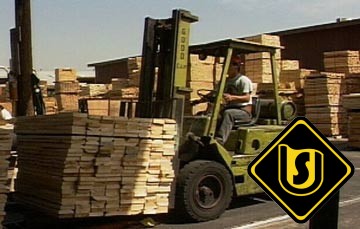Injured worker reportedly did ‘donuts’ with forklift: Will he get workers’ comp?

One day, Weaver was returning the forklift to its storage location when it overturned, entrapping him between the roll bars. Weaver says he turned too quickly, causing the forklift to overturn.
Weaver suffered extensive injuries, including ones to his head, neck, back, pelvic bone, liver and spleen. He required several months of in-patient care and an extended stay in an assisted living facility. He applied for workers’ comp benefits, but his claim was denied by Seegars’s workers’ comp carrier (Dan the Fence Man didn’t carry workers’ comp insurance, so Seegars became the statutory employer).
The reason Weaver was denied comp? The owner of a business next door to Seegars who was working about 300 to 350 feet from the storage yard the day Weaver was injured says he saw the forklift being driven in donuts.
Weaver appealed. A workers’ comp commissioner upheld the coverage denial, finding testimony from the next-door business owner to be credible. The full North Carolina Industrial Commission affirmed the commissioner’s opinion. The Commission also credited testimony by an accident reconstruction expert that photos showed curved tire impressions at the scene that were consistent with the forklift driving in tight circles.
The Commission found “the manner in which [Weaver] operated the forklift preceding his injury was unreasonable and reckless, in essence joy riding and/or thrill seeking.”
Weaver appealed.
Inconsistent findings
Weaver argued before the North Carolina Court of Appeals that the Commission’s conclusion that the way he operated the forklift removed him from the scope of employment wasn’t correct. The court agreed with him. Here’s why:
North Carolina courts use a test to determine whether an employee’s injury was caused by employment.
The court divided injuries into two types: those caused by actual performance of the job, and those caused by incidental activities.
If incidental activities are either “too remote from customary usage and reasonable practice” or “are extraordinary deviations,” then they don’t qualify for workers’ comp.
The court also noted that it’s the worker’s unreasonable actions, not the negligent manner in which they’re performed, which should be considered.
In Weaver’s case, the appeals court found the Commission’s findings were inconsistent. The Commission had found:
- “Plaintiff was ‘joyriding’ or ‘thrill seeking’ which bore no relation to accomplishing the duty for which Plaintiff was hired,” and
- “Plaintiff may have initially performed some work-related tasks with the forklift.”
The appeals court said the second statement undermined the first one. Weaver testified the forklift overturned as he was returning it to the warehouse after using it for work purposes. The Commission didn’t note whether it found this testimony credible.
The result: The appeals court vacated the earlier opinion and remanded the case back to the Commission to determine whether Weaver’s injuries arose out of and in the course of employment.
To guide the Commission as it reconsiders Weaver’s case, the appeals court noted:
“The Commission’s conclusion is grounded in findings that characterize the speed and manner in which [Weaver] operated the forklift. These findings do not address whether Weaver was operating the forklift in furtherance of – or incidental to – his job duties and his employer’s interest. These findings appear to impute negligence on behalf of the employee, indicating the Commission reached its decision under a misapprehension of law.”
Does this mean any type of horseplay qualifies for workers’ comp in North Carolina? No. The appeals court gave examples in which state courts have denied comp benefits when an employee:
- rode on a crate conveyor belt, and
- fell from a seven-and-a-half foot fence on his employer’s property.
Neither riding the conveyor belt nor climbing a fence had anything to do with the employee’s job in those cases.
It appears that, if the Commission finds Weaver had been using the forklift to perform job duties, he may be eligible for workers’ comp benefits.
A side note in this case: Weaver received no training or certification to operate a forklift and says no one ever told him not to drive one.
Source: (Shaun Weaver v. Daniel Glenn Dedmon et al, Court of Appeals of North Carolina, No. COA16-55, 5/16/17)
Newer articles